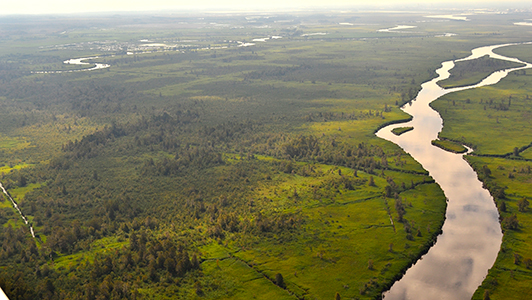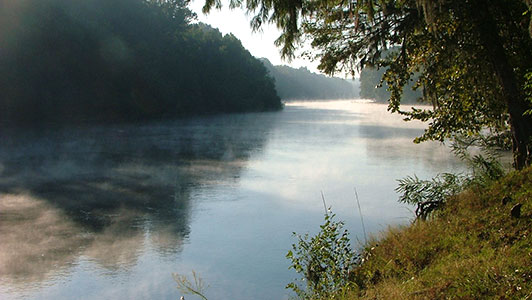Floating along the Savannah River’s forested banks, you probably aren’t thinking “Wow, what a great water treatment facility!”
Maybe you should.
Nearly two-thirds of America’s clean water supply comes from stream flow cycled through forests. These natural systems filter runoff and break down contaminants, producing high-quality water to support human and industrial uses. And there’s economic value in this “green infrastructure” — it operates 24/7 and runs on sunshine. Shouldn’t we conserve these free ecosystem services and the land that provides them?
The vision for protecting the Lower Savannah watershed for the sake of long-term water quality goes back to 2009 when a group including conservation organizations, landowners, forestry companies, government agencies, and water utilities began exploring the idea. With confidence in the premise, the Savannah River Clean Water Fund (SRCWF) was established in 2016 to coordinate the initiative.
According to Braye Boardman, SRCWF’s Executive Director, “If you ask people what the economic drivers are for Augusta and Savannah, they will list nearly everything but the river itself. We needed to change that. With approximately 75 percent forest cover here in the Savannah Valley, clean water costs our utilities about $40 million per million gallons to produce (based on data from a national study). Without forest cover, these costs would nearly quadruple. Projections for accelerated population growth and industrial development along this river tell us we don’t have the luxury of taking thirty years to conserve our watershed like New York City did with the Hudson. Ultimately, communities around the world with an abundant, clean water supply will be the economic winners.”
The value proposition for water utilities is clear: conserving land now and promoting better land management practices is less expensive that building water treatment capacity down the road. So far, five water utilities have pledged a total of $1.133 million per year for three years toward land conservation, better land management practices, and science and research in the Savannah River valley. In addition, municipal water utilities are key members of the SRCWF’s management and advisory structure along with state and federal agencies, land trusts, environmental NGOs, and philanthropic foundations. Boardman observed, ” Utilities around the country are beginning to look at investments in green infrastructure as part of their multi-tier strategy to provide quality drinking water to their customers. But this is the first time water municipalities in two states, covering a 2.8 million acre watershed, have pooled resources together to protect their source-water and ensure a sustainable supply of clean water for generations to come. When utilities invest in clean water, they know they are investing in something important to their taxpayers and water users, especially if they can accomplish it in a more cost-effective manner,” according to Boardman.
 Using maps generated by The Nature Conservancy, SRCWF has targeted 210,000 acres in the watershed as critical priorities for maintaining water quality, with a goal of protecting 8,000 acres annually. The estimated cost over the life of the project is $52 million. Unlike South Carolina, Georgia has no state conservation fund providing financial incentives for landowners to place their land under conservation easements or otherwise enhance protection for these critical acres. As such, donors will play a critical role.
Using maps generated by The Nature Conservancy, SRCWF has targeted 210,000 acres in the watershed as critical priorities for maintaining water quality, with a goal of protecting 8,000 acres annually. The estimated cost over the life of the project is $52 million. Unlike South Carolina, Georgia has no state conservation fund providing financial incentives for landowners to place their land under conservation easements or otherwise enhance protection for these critical acres. As such, donors will play a critical role.
The project offers a compelling opportunity for conservation philanthropy. With core support from water utilities, SRCWF is committed to seeking annual matching funds to support land acquisition, conservation easements, deed restrictions, responsible land stewardship and land management practices, as well as education and scientific research related to water quality. “We need to make the strongest pitch possible to landowners and to other funders that this is not just about conserving a landscape, wildlife, and the outdoors but also generating a real return on investment in the form of clean water — something that none of us can do without,” says Boardman. “By underwriting land conservation, we also can maintain and create family-supporting jobs in forestry and agriculture.”
For more information about SRCWF, please contact Braye Boardman at 706-530-5962. Until SRCWF’s website is completed, a temporary site can be found at http://www.usendowment.org/ntmsrcwf.html.
Photos by Savannah RiverKeeper.

